Orchard Audio STARKRIMSON (BOSC) Mono amplifiers By Ross Wagner
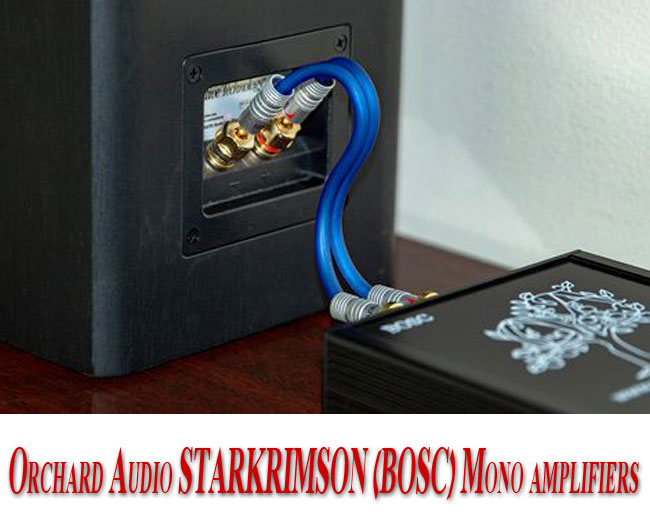
When bad news becomes a welcome surprise.
I’m a tube guy. Yup, you know, those big power amps that suck up kilowatt-hours and $$$ as tubes die, often taking resistors and other assorted electronic items with them. Yet, for a classical music lover they are often the perfect choice. Thus, I steer clear of solid-state and class-D products even though they do offer valid sonic alternatives and tend to be a more practical choice.
However, a few months ago, one of my tube amps developed another case of the hiccups. My attentive dealer came over for a house call and determined that the problem was much worse than hiccups; a trip to the factory for serious surgery was necessary. Very bad news for I was without music and the COVID-19 quarantine was closing in.
 Then, worse news from the factory: The needed repairs would take weeks. What to do? Time to call audio buddies who might have a pair of amps available to tide me over. Mark Block, a local audiophile friend, had a pair of STARKRIMSON (BOSC) amps on loan. These amps are the brainchild of Leo Ayzenshtat at Orchard Audio, a nearby New Jersey designer and maker of a line of intriguing, affordable audio gear. Leo agreed to let me have a listen.
Then, worse news from the factory: The needed repairs would take weeks. What to do? Time to call audio buddies who might have a pair of amps available to tide me over. Mark Block, a local audiophile friend, had a pair of STARKRIMSON (BOSC) amps on loan. These amps are the brainchild of Leo Ayzenshtat at Orchard Audio, a nearby New Jersey designer and maker of a line of intriguing, affordable audio gear. Leo agreed to let me have a listen.
Note: Leo, a lover of fruit, anoints his products with the names of his favorites. Thus, this amp was initially christened as “BOSC,” a delicious pear. The name is being changed to STARKRIMSON, another favorite pear, at the request of Bosch of Germany.
Mark arrived with a small carton weighing under 10 pounds. Where were the monoblock amps? I asked if I could help carry them in. “Nope,” Mark smiled, “both amps are in the box.” I glanced up at Mark Porzilli’s 90-driver, line-source Pipedream speakers and wondered: Would David be able to handle Goliath?
Each STARKRIMSON amp consists of two parts joined by a short length of umbilical cable: first, the power supply, about the size and heft of a three-pound block of Cabot Vermont cheddar; second, the brain of the amplifier, accepting balanced inputs from the preamp (RCA-to-XLR adapters supplied) and sturdy output terminals for the speakers. The amplifier modules are just 5.5″ x 4.8″ x 1.8″ and weigh 2 pounds, less than a husky Russian rye bread from Belarus, Leo’s birthplace some decades ago. Leo’s design will make 150 watts RMS into an 8 Ohm. The power supply is dimensioned at 8″ x 3.7″ x 1.7″.
 There are two minor variations of this amp: inline, with the power and XLR inputs on the back and the speaker outputs (located on the front). This allows the little amps to be hung from your speaker terminals with very short cables runs. Choose the traditional: with all connections at the rear. This makes for a cleaner-looking installation if the amps are placed on a shelf. Leo sells a pair of 11″ speaker wires (10awg) with locking banana plugs for $75, should you choose the inline version. Longer cables are available. Confused? Not to worry, Leo will help you with the choices. (Note: Leo prefers to keep the connection to the speakers as short as possible, creating a pseudo “powered” speaker.)
There are two minor variations of this amp: inline, with the power and XLR inputs on the back and the speaker outputs (located on the front). This allows the little amps to be hung from your speaker terminals with very short cables runs. Choose the traditional: with all connections at the rear. This makes for a cleaner-looking installation if the amps are placed on a shelf. Leo sells a pair of 11″ speaker wires (10awg) with locking banana plugs for $75, should you choose the inline version. Longer cables are available. Confused? Not to worry, Leo will help you with the choices. (Note: Leo prefers to keep the connection to the speakers as short as possible, creating a pseudo “powered” speaker.)
The sound surprised me. This was not of the generation of Class-D amps I had been auditioning just a few years ago. Yes, those products were pleasing, but after a few days of listening, I was left uninvolved. Something was missing. Leo’s little guys, boasting the newest GaN (gallium nitride) transistors and modestly priced at $1500 for the pair, lit up the music room. During weeks of listening, Leo’s STARKRIMSON amps maintained their allure throughout.
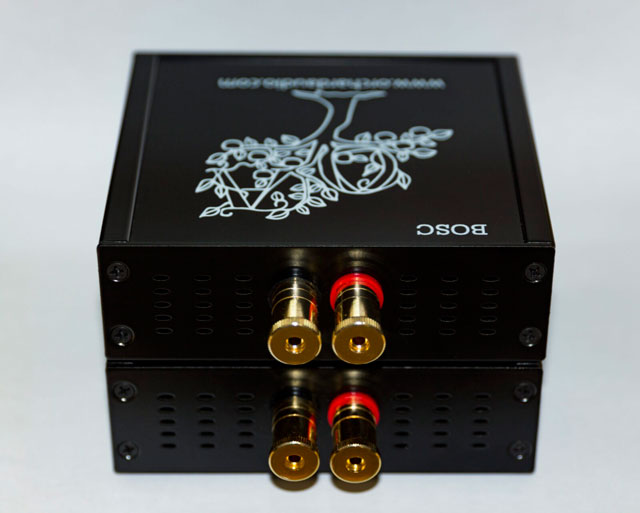
Virtues: dynamic, well defined deep bass, excellent staging, imaging and resolution throughout. All this was maintained through demanding crescendos, with airy upper ranges, while conserving the subtleties of decay- especially welcomed on pizzicato and percussion segments. The highs were extended, but a mite dry. I did detect a bit of thinness in the violins. Or perhaps the amps exaggerated the digititis in some of my recordings. Or a fault in my system.
One design element was particularly interesting. STARKRIMSON’s gain is deliberately low, 16.8 dB, requiring 5V input to achieve full power. That yields two advantages according to Leo: 1) Noise from input devices (DAC, preamp, etc.) will be less amplified; 2) Having lower gain in the amp means that the device driving the amplifier will be used closer to its full output level. This increases the dynamic range and signal-to-noise performance of the whole system. In practice, my Audio Research REF 3 line stage was a perfect match to the STARKRIMSON, reaching full room volume with a setting around 80%. Yummy.
Bottom line: exceptional sound quality, thoughtful and sturdy build quality, great value and made in New Jersey, USA.


Ross Wagner
Specifications:
Price: $1,499.00
Gain: 16.8dB or 6.92
Signal to Noise Ratio (SNR): 121dB (A-weighted)
Residual Noise: 32uV (A-weighted)
THD* @ 10W: <0.0003% (-110dB) for 1kHz into 8Ω
THD @ 0.25W: <0.0030% for 20Hz – 20kHz into 8Ω
THD @ 10W: <0.0013% for 20Hz – 20kHz into 8Ω
THD @ 75W: <0.0050% for 20Hz – 20kHz into 8Ω
THD @ 150W: <0.015% for 20Hz – 20kHz into 8Ω
THD @ 10W: <0.0004% (-108dB) for 1kHz into 4Ω
THD @ 0.25W: <0.0030% for 20Hz – 20kHz into 4Ω
THD @ 10W: <0.0025% for 20Hz – 20kHz into 4Ω
THD @ 75W: <0.0092% for 20Hz – 20kHz into 4Ω
THD @ 150W: <0.015% for 20Hz – 20kHz into 4Ω
Frequency Response: DC – 60kHz+
Sensitivity: 5Vin for 150W into 8Ω
Sensitivity: 3.5Vin for 150W into 4Ω
Input Impedance: 5kΩ fully balanced
Output Power: 150Wrms
Damping Factor: >550 @ 1kHz
BOSC Size: 5.5″ (14cm) x 4.8″ (12.2cm) x 1.9″ (4.8cm) — not including binding posts
Power Supply Size: 8″ (20.4cm) x 3.7″ (9.4cm) x 1.72″ (4.35cm) – not including cables
*THD – Total Harmonic Distortion
A treasure trove of specifications, photos and measurements awaits all interested audiophiles at www.orchardaudio.com
Contact information: leo@orchardaudio.com
Telephone: 504.233.3444
Stereo Times Masthead
Publisher/Founder
Clement Perry
Editor
Dave Thomas
Senior Editors
Frank Alles, Mike Girardi, Russell Lichter, Terry London, Moreno Mitchell, Paul Szabady, Bill Wells, Mike Wright, and Stephen Yan,
Current Contributors
David Abramson, Tim Barrall, Dave Allison, Ron Cook, Lewis Dardick, John Hoffman, Dan Secula, Don Shaulis, Greg Simmons, Eric Teh, Greg Voth, Richard Willie, Ed Van Winkle, Rob Dockery, Richard Doron, and Daveed Turek
Site Management Clement Perry
Ad Designer: Martin Perry


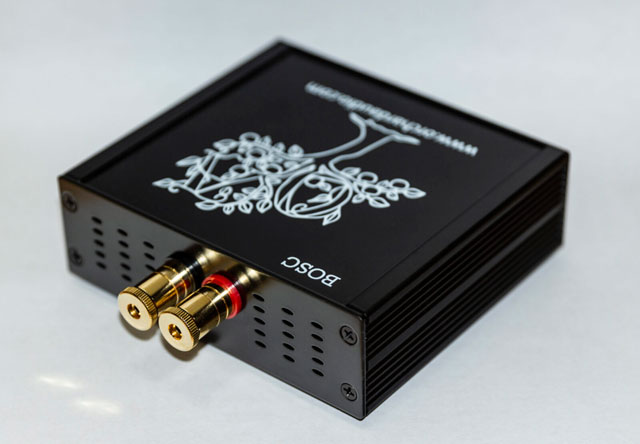
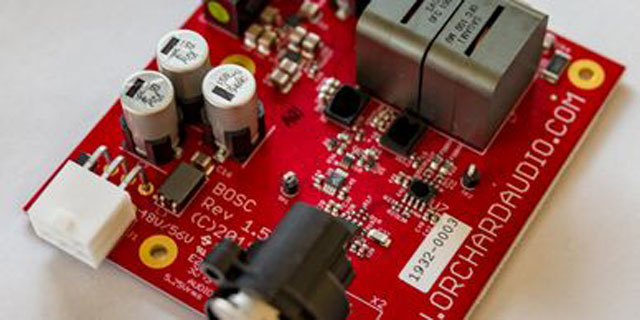
.jpg?KeepThis=true&TB_iframe=true&height=430&width=700)

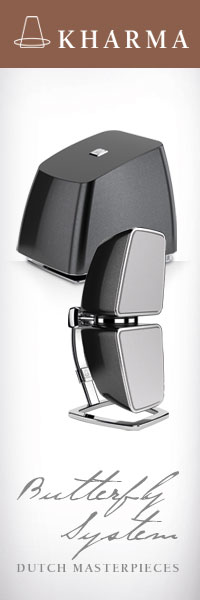

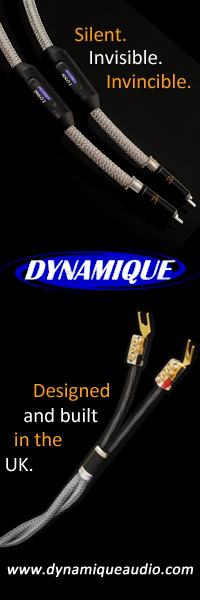
Be the first to comment on: Orchard Audio STARKRIMSON (BOSC) Mono amplifiers By Ross Wagner